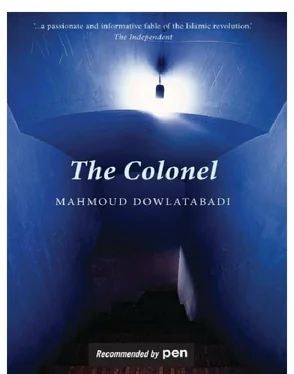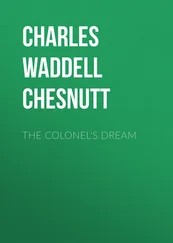Thereafter, though, what seemed odd to the colonel was that, unlike the other teachers who had been sacked and wore their dismissal as a badge of honour and who, for a while at least, had exploited it to boost their egos, Amir cut himself off from everyone and retired to the basement. He lost all interest in life, and made no secret of it. He did not always show it in public, but he did not force it on anyone, either. Most people, including his sister Farzaneh, judged his silent introspection by normal standards, but the colonel saw it in a different light: I saw that Amir had arrived at a new certainty. He had realised that this was a way of isolating him and his ilk from society as a whole . For the colonel could not believe that being sacked, on its own, could have had such a demoralising effect on Amir. He knew his son; coming as it did after he had been prevented from continuing his university studies, his subsequent dismissal from his teaching post would have taken on far greater significance than just one of those disappointments that happens now and again at work. I could see from the way my son reacted that he felt deeply humiliated. Perhaps I can’t explain exactly what I mean, but I’ll try to find the right words. Yes, my son believed he had been rejected and ostracised by society, something that he had never envisaged for himself. Maybe this had speeded up the process of his disintegration, which was why he was now turning all his energies to shutting others out of his life. From that day on Amir never wound his watch again, and did not read a newspaper or listen to the radio. the colonel never saw him buy another book, or begin reading a new one. Amir never even left the house.
Meanwhile, the colonel had slowly undressed and was trying to wrap his freezing bones in a tattered old sheet to keep warm. He was thinking that, if he could see himself in a mirror, he would look like a harmless little goblin. Then, forgetting all about Amir for a moment, he suddenly realised that his clothes were still wet — but he needed them today, this very day, which had followed on from yesterday and would slide into tomorrow without stopping. Today, he would have to put his suit on once more and go out into this wretched rain again, this time for the funeral of his Little Masoud. It was enough to make you weep — except that he felt no self-pity and could not cry. In this situation, where absolutely nothing seemed to be normal, and indeed nothing was normal, the colonel simply felt unclean and disgusting and that there was nothing human about him. All he wanted to do at that moment was to be able to purge himself of all the filth and misfortune, to slough his skin, his whole body, his entire being, and so free himself from the dirt, death and humiliation that surrounded him. He had to accept all these wounds, all this pain and corruption, as just a disease, a disease that he wanted to get away from and shake the filth of it off his back. He wanted to scrub off the dirt and filth; he wanted to scrape the scrofula off himself, but he was incapable of recognising the baneful truth that its cold abscesses had already invaded the stinking fabric of his being and had taken it over.
Knowing what he did about the state Amir was in, how could he possibly demand that he come with him to Masoud’s funeral? On the other hand, if he did not tell him, it might well later come back to haunt him that he had kept quiet about his brother’s death at the front.
He was shivering; the dwindling warmth of the stove and the tatty sheet did nothing to dispel the cold that had penetrated to the marrow of his bones. The teapot and kettle were still sitting on top of the stove and the tea glasses were on the table in their saucers, with the remains of yesterday’s tea still in them. the colonel took the sugar bowl down from the shelf above the fire, glancing as he did so at Amir’s watch on the mantelpiece, which had been sitting there, unwound, for more than a year. He did not know what time of day it was, or whether it was yesterday or tomorrow. He knew that its hands had stopped, frozen in one long, leaden moment of time. He would have to drink this tepid tea and think about getting the stove going again. He felt that all the last few days had been compressed into one, and all the past seasons into one long cold season, a season that was as cold and lifeless as lead. 32
On a whim, he asked Amir: “What do you know about the days and the seasons? Can you remember anything about spring and autumn, summer and winter?” Amir gave no answer and the colonel expected no answer to such a pointless question. He did not exactly expect Amir to burst into speech and tell him, or anyone else for that matter, what was on his mind. For some time now, he had realised that Amir had lost his past, and he had even heard him saying it: “I feel as though my past, all the lines my past is written on, have been wiped out with a rubber.” And the colonel wondered how a man without his past could live. And how could a man without a past have a future? the colonel’s son, Amir had become aware of his loss of identity, of his lack of identity, and believed in it and had accepted it. The tragedy of my eldest son’s life is that he has lost his belief, and his nightmare might be that he knows he had a hand in the killing of his sister and brothers. the colonel’s view was that such a creature, if he exerted all his hidden, innermost strength, would only destroy himself. His masterpiece would be to bury his own corpse.
I don’t exist, I’m nobody’s child, I belong nowhere. I exist only to deny my existence. My final trick will be to choose the manner and time of my own death, so that others will have to take to their graves their wish to kill me. This is the only way that I can take my revenge on the horror that has engulfed us. It’ll also be my revenge against myself. For I worked for the glory of the revolution, committing all kinds of crimes in its name. In fact, the only crime I had nothing to do with was the one involving that bloodstained knife!
At first the colonel could not take Amir seriously, and he ascribed the boy’s ravings to his fragile mental condition. But in a strange way he gradually began to grasp their meaning. He would never have believed that the day would come when, as a father, he would accept his son’s judgement without demur. Revenge… Amir was always emphasising the word ‘revenge,’ a word whose proper meaning, at least from Amir’s point of view, was a long way from the colonel’s view of it.
“Father, the tragedy is this! They say that the servants whom the Almighty loves, he kills. And I see that our country kills those who love it the most. Is this country committing suicide? They get under your skin, they use you to speak for them and, in your name, they then kill you. Crying ‘salvation and welfare’ they drive you to destruction. Your servants — people like you were once — are destroying you. First they denounce you with their eyes, then they falsify your identity with their tongues and, finally, they shred you with their teeth. And then you hear a terrible cry coming from the herd of gullible fellow-travellers, which sends a shiver down your spine, a chant that has been dinned into them: ‘Kill them! Tear them apart! Your number one enemy is the brother who shared your mother’s milk. There is a snake in your bosom, smash its head in! Your own children are snakes, your sister and your mother, your own kith and kin, the whole generation of your youth, even your friends! If anyone dares to laugh, smash his teeth in!’ Laughing is counted as treason, mourning and lamentation are now the order of the day. You are allowed to lament your own innocence, your stupidity and your perfidy and join in the general chorus of wailing. This pantomime delights the seekers after vengeance, it gives them the chance to laugh at their victims. All that remains are hollow creatures who have capitulated and who accept the most lethal sicknesses as normal. When those after us come to judge us, they will say: ‘Our forebears were people who lied to themselves, who believed their own lies and sacrificed themselves to them. And if they ever doubted their beliefs, they were lined up and it was off with their heads!’”
Читать дальше












